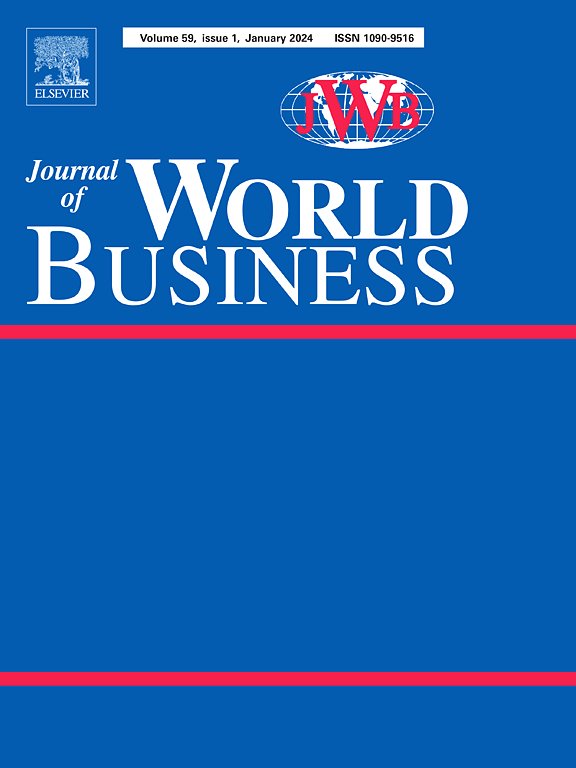The home country effect on between- and within-firm performance differences
IF 8.8
1区 管理学
Q1 BUSINESS
引用次数: 0
Abstract
This study estimates the home country effect on multinational firm performance using data from 117 home countries (28,079 firms) and 123 host countries (85,579 affiliates) from 2010 to 2019. Using a variance decomposition approach, we find that the effect explains a sizable portion of variance between firms but is mostly trivial for performance differences among foreign affiliates within firms. These findings complement and improve research on location effects, informing the debate on the conceptualization of the home country effect. We revise assumptions about the transferability of homegrown advantages and highlight the importance of aligning theory and empirics in understanding performance differences globally.
母国对企业间和企业内部绩效差异的影响
本研究利用 2010 年至 2019 年期间来自 117 个母国(28,079 家公司)和 123 个东道国(85,579 家子公司)的数据,估算了母国对跨国公司绩效的影响。利用方差分解法,我们发现母国效应解释了企业间相当大一部分的方差,但对于企业内部外国子公司之间的绩效差异而言,母国效应大多微不足道。这些发现补充并完善了有关区位效应的研究,为有关母国效应概念化的讨论提供了信息。我们修正了关于本土优势可转移性的假设,并强调了在理解全球绩效差异时将理论与实证相结合的重要性。
本文章由计算机程序翻译,如有差异,请以英文原文为准。
求助全文
约1分钟内获得全文
求助全文
来源期刊

Journal of World Business
BUSINESS-
CiteScore
16.50
自引率
11.20%
发文量
73
期刊介绍:
The Journal of World Business holds a distinguished position as a leading publication within the realm of International Business. Rooted in a legacy dating back to 1965, when it was established as the Columbia Journal of World Business, JWB is committed to disseminating cutting-edge research that reflects significant advancements in the field. The journal actively seeks submissions that propel new theoretical frameworks and innovative perspectives on International Business phenomena. Aligned with its domain statement, submissions are expected to possess a clear multinational, cross-border, or international comparative focus, while remaining pertinent to the study of management and organizations. JWB particularly encourages submissions that challenge established theories or assumptions, presenting pioneering or counterintuitive findings. With an inclusive approach, the journal welcomes contributions from diverse conceptual and theoretical traditions, encompassing allied social sciences and behavioral sciences. Submissions should either develop new theories or rigorously test existing ones, employing a variety of qualitative, quantitative, or other methodological approaches. While JWB primarily caters to scholars and researchers, it values contributions that explore implications for Multinational Enterprises and their management, as well as ramifications for public policy and the broader societal role of business.
 求助内容:
求助内容: 应助结果提醒方式:
应助结果提醒方式:


